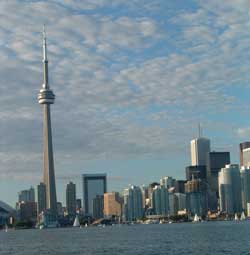|
Multiculturalism in Canada
Galina Ovsishcher
A teacher of Toronto Bond International College (Canada)
Every country has its own peculiar1 characteristics, which make it unique and different from other countries. Russia is known to be the biggest and most unpredictable2, China is the one with lots of people who are very industrious3, France is the cradle of love and romance, and etc. Some people think of Canada as another state of the USA, and without doubt, there are many things that these two countries have in common. Multiculturalism is the one of these similar features. But even being so, people from different backgrounds live in Canada like no other heterogeneous4 societies do anywhere else in the world including the United States.

Toronto
One can say that the example of multiculturalism in Canada can prove again one of the basic Marxist concepts of the unity and struggle of opposites5. On the one hand families of one background try to preserve their own cultural traditions and customs forming in such mega-polis, like Toronto districts called Little Italy, Little Greece, Chinatown, Korean town, Russian-Jewish town, Ukrainian town, etc. If you visit the Russian part of Toronto, you will see Russian stores with Russian names written in Cyrillic alphabet; you will hear Russian speech and even see Russian cars. The difference from Brighton Beach (USA) is that not only the first generation of immigrants to Canada preserve Russian traditions, but younger generations also try to stick together “hanging around”, singing Russian songs, solving “eternal” Russian problems of “what to do?” and “who is to blame?”. This supports the symbol of Canadian multiculturalism known as “cultural mosaic” forming the nation of Canadians as a quilt with district design of bright patches, representing this or that particular culture (the symbol of the society in the United States is the “melting Pot” where the next generations of immigrant families try to assimilate6 with “native” Americans).
On the other hand, there is no other country in the world where different nations are so tolerant7 to each other. Moreover, you can safely say that Canadians on the whole are tolerant to each other. You can have any views or credos and (unless they are not safe to others) you’ll be accepted and treated equally and with respect. There is no one truth which is right and other views that are wrong. This state of things makes a person very happy. Canadians enjoy freedom of thought, religion, political views and equal rights without discrimination of any sort. In the business where I work the owners are Chinese, the employees are Chinese, Polish, Russian, Rumanian, German, Italian, Irish, Trinidadian, Indian, Jamaikan, South African and English. We all speak English at work and our native languages at home. I have two Korean friends. We visit each other’s homes, take care of each other and appreciate our friendship very much. I like Korean kim-chee8 and they like my borshch. We discuss our problems and support each other with help and advice. There is no dominant culture in Canada belonging to any particular nationality. We celebrate Chinese New Year and African Kwanza9. To be politically correct Christmas greeting cards are sold together with other holiday Season cards as there are many other holidays that Canadians celebrate in winter including Jewish and Muslim holidays. You’ll be excused from work or school if there is a holiday on this day. You are welcome to join the Irish on St. Patrick’s Day or celebrate the pride of gays and lesbians on the day of their Parade in Toronto, or enjoy Carribana – the colourful parade of the Caribbeans.
Nobody is calling you names or considers being superior to your point of view or way of life. You are free from judgement, you are free to choose. You are free.
1 peculiar – специфический
2 unpredictable – непредсказуемый
3 industrious – трудолюбивый
4 heterogeneous – неоднородный
5 the unity and struggle of opposites – единство и борьба противоположностей
6 assimilate – ассимилироваться, сливаться (с другой национальностью)
7 tolerant – терпимый
8 kim-chee – очень острое корейское овощное блюдо
9 Kwanza – праздник Кванза отмечают с 26 декабря по 1 января чернокожие жители Сев. Америки
Читать еще в этом номере:
|
|











